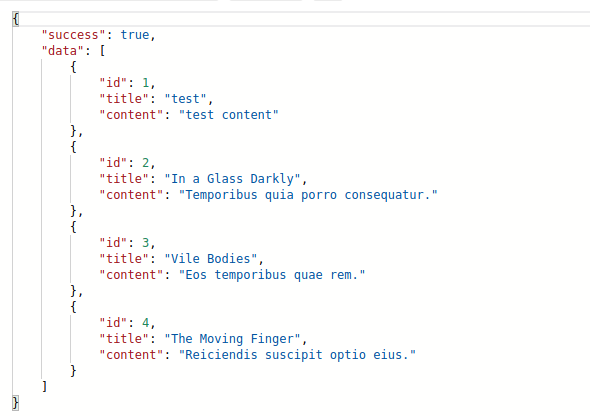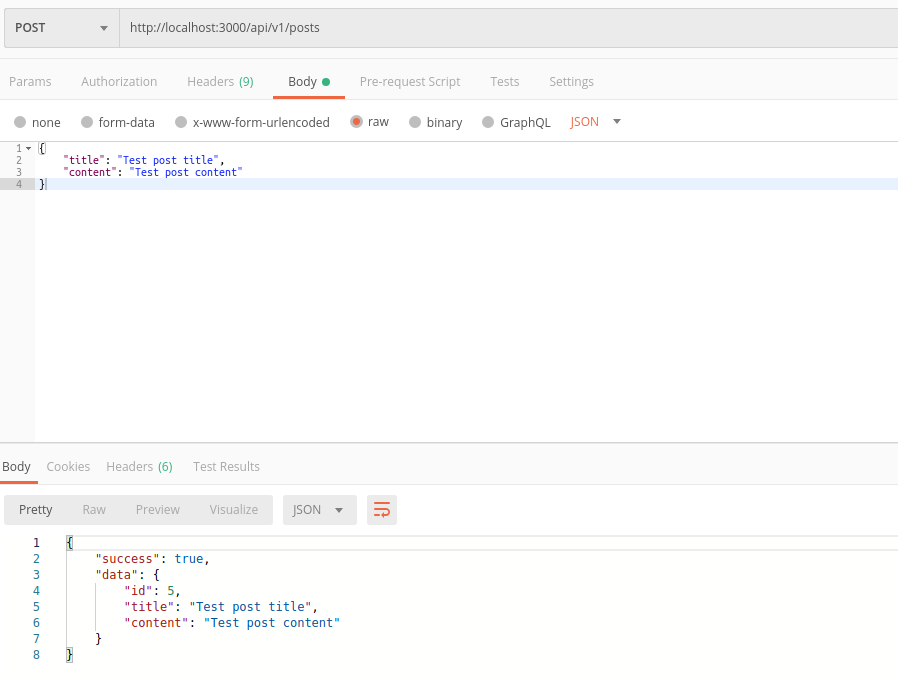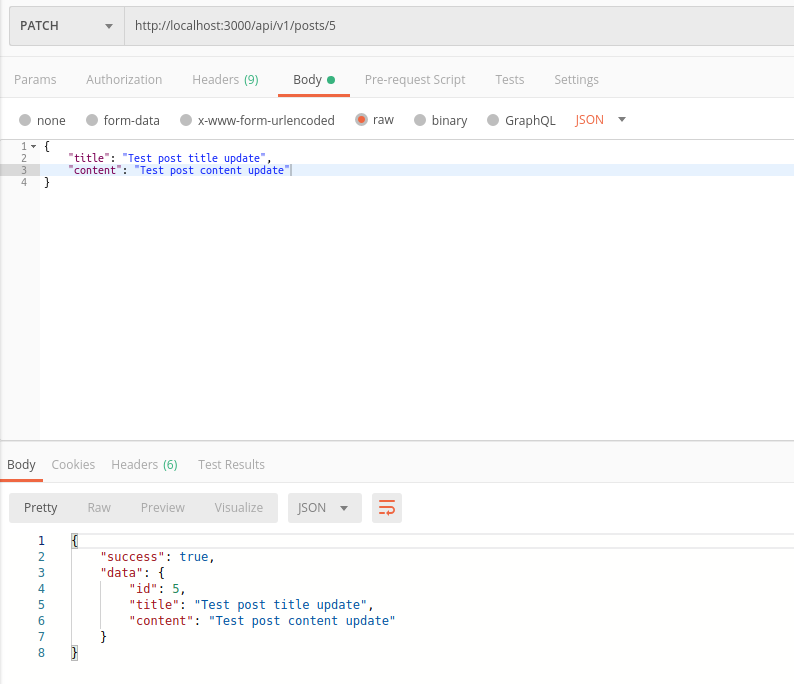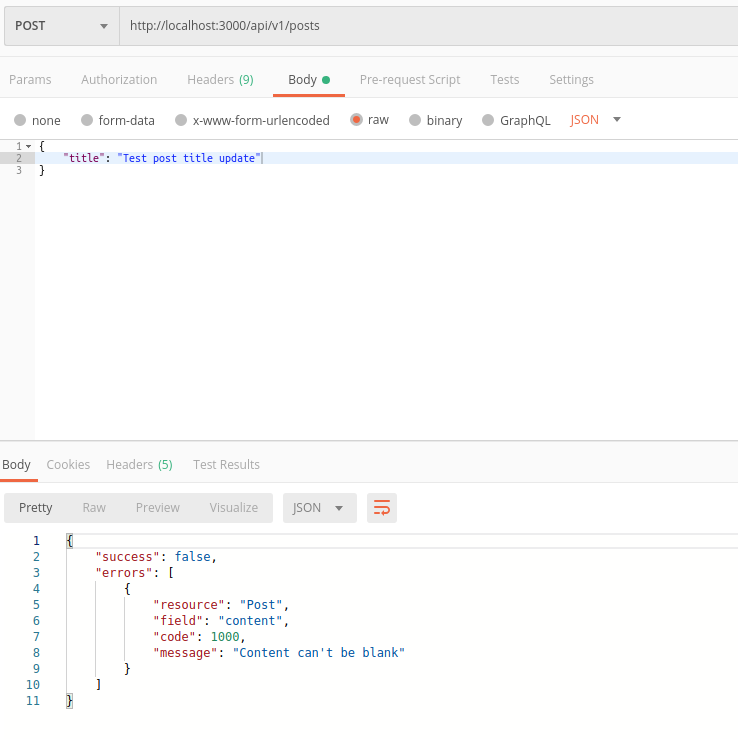Xây dựng một ứng dụng Restful API đơn giản với Rails 5 (Phần 2)
Bài đăng này đã không được cập nhật trong 5 năm
Ở phần 1 mình đã xây dựng được một ứng dụng API cơ bản, tiếp theo mình sẽ áp dụng gem active_model_serializers để xây dựng các response chuẩn cho ứng dụng.
Active model serializers
ActiveModelSerializers tạo convention về cấu hình sang dạng Json.
ActiveModelSerializers hoạt động thông qua hai thành phần: serializers và adapter.
Serializers mô tả về các thuộc tính và các mối quan hệ cần được nhắc đến.
Adapters mô tả cách mà các thuộc tính và các mối quan hệ được nhắc đến.
SerializableResource phối hợp các resources , Adapter và Serializer để xuất bản các tài nguyên serialization. Các serialization có #as_json, #to_json và #serializable_hash các phương pháp được sử dụng bởi Rails JSON Renderer.
Cài đặt
Thêm gem "active_model_serializers" vào Gemfile. Sau đó chạy bundle install
Tạo serializers
Chạy lệnh rails g serializer post để khởi tạo serializer chô model post mà ta đã tạo từ trước.
#app/serializers/post_serializer.rb
class PostSerializer < ActiveModel::Serializer
attributes :id, :title, :content
end
Như vậy là chúng ta đã khởi tạo xong serializer để sử dụng.
Response sử dụng serializers
Mình sẽ viết lại các phương thức trong PostsController sử dụng serializer
index
def index
@posts = Post.order('created_at DESC')
render json: {
success: true,
data: ActiveModel::Serializer::CollectionSerializer.new(@posts, serializer: PostSerializer)
}
end
Kết quả test với Postman

show
def show
render json: {
success: true,
data: PostSerializer.new(@post)
}
end

create
def create
@post = Post.new post_params
@post.save!
render json: {
success: true,
data: PostSerializer.new(@post)
}
end

udpate
def update
@post.update! post_params
render json: {
success: true,
data: PostSerializer.new(@post)
}
end

destroy
def destroy
@post.destroy!
render json: {
success: true,
data: PostSerializer.new(@post)
}
end
Bắt các lỗi cơ bản với serializers
Validation Errors
Đầu tiên chúng ta sẽ khai báo một class dùng chung để sử dụng cho các serializer bắt lỗi.
#app/serializers/api/errors/base_errors_serializer.rb
class Api::Errors::BaseErrorsSerializer < ActiveModel::Serializer
attribute :success
attribute :errors
def success
false
end
end
Response sẽ gồm 2 attribute là success để thông báo trạng thái và errors để đưa ra danh sách lỗi.
Tạo class bắt lỗi validate kế thừa từ class BaseErrorsSerializer
#app/serializers/api/errors/validation_errors_serializer.rb
class Api::Errors::ValidationErrorsSerializer < Api::Errors::BaseErrorsSerializer
def errors
object.errors.details.map do |field, details|
details.map.with_index do |error_details, index|
Api::Errors::EachValidationErrorSerializer.new(
object, field, error_details, object.errors[field][index]).generate
end
end.flatten
end
end
#app/serializers/api/errors/each_validation_errors_serializer.rb
class Api::Errors::EachValidationErrorSerializer
def initialize record, error_field, details, message
@record = record
@error_field = error_field
@details = details
@message = "#{field} #{message}"
end
def generate
{
resource: resource,
field: @error_field,
code: code,
message: @message
}
end
private
def resource
I18n.t(
underscored_resource_name,
scope: [:api_validation, :resources]
)
end
def field
I18n.t(
@error_field,
scope: [:api_validation, :fields, underscored_resource_name]
)
end
def code
I18n.t(
@details[:error],
scope: [:api_validation, :codes]
)
end
def underscored_resource_name
@record.class.to_s.gsub("::", "").underscore
end
end
Tiếp theo ta cần khai báo để trả về khi xảy ra validate exception.
#app/controllers/concerns/exception_rescue.rb
module ExceptionRescue
extend ActiveSupport::Concern
included do
rescue_from ActiveRecord::RecordInvalid, with: :render_invalidation_response
def render_invalidation_response exception
render json: exception.record, serializer: Api::Errors::ValidationErrorsSerializer,
status: :bad_request
end
end
end
#app/controllers/api_controller.rb
class ApiController < ActionController::API
include Api::ExceptionRescue
end
Cuối cùng là khai báo I18n
#config/locales/en.yml
en:
api_validation:
resources:
post: Post
fields:
post:
title: Title
content: content
codes:
blank: 1000

Record Not Found
Trường hợp lỗi xảy ra khi không tìm thấy record tương ứng, ta cũng xây dựng một class để khai báo lỗi.
#app/serializers/api/errors/active_record_not_found.rb
class Api::Errors::ActiveRecordNotFound
attr_reader :model, :detail, :message_key
def initialize error, message: nil
@model = error.model.underscore
@detail = error.class.to_s.split("::")[1].underscore
@message_key = message || :default
@errors = serialize
end
def serialize
{
resource: resource,
code: code,
message: message
}
end
def to_hash
{
success: false,
errors: serialize
}
end
private
def message
I18n.t "params_exception.active_record.record_not_found.message"
end
def resource
I18n.t(
underscored_resource_name,
scope: [:api_validation, :resources]
)
end
def code
I18n.t detail,
scope: [:api, :errors, :code],
default: detail,
locale: :api
end
def underscored_resource_name
@model.to_s.gsub("::", "").underscore
end
end
Thêm vào file exception_rescue.rb
rescue_from ActiveRecord::RecordNotFound, with: :render_record_not_found_response
def render_record_not_found_response exception
render json: Api::Errors::ActiveRecordNotFound.new(exception).to_hash, status: :not_found
end
Chỉnh sửa phương thức load_posts trong PostsController để raise ra lỗi với phương thức find_by! khi không tìm thấy record
def load_post
@post = Post.find_by! id: params[:id]
end
 I18n
I18n
en:
api_validation:
resources:
post: Post
fields:
post:
title: Title
content: Content
codes:
blank: 1000
invalid: 1002
record_not_found: 1100
params_exception:
active_record:
record_not_found:
code: 3001
message: No data found.
argument_error:
code: 3002
message: Incorrect parameter.
record_not_destroyed:
code: 3003
message: Cannot be deleted.
Tổng kết
Qua 2 bài viết, mình đã tóm tắt lại cách xây dựng một ứng dụng API đơn giản với Ruby on Rails. Từ những kiến thức cơ bản này chúng ta có cơ sở để tìm hiểu sâu hơn và nâng cao hơn về API và RoR. Bài viết này nhằm mục đích ghi nhớ lại kiến thức cơ bản để xây dựng API do mình tự tìm hiểu do đó sẽ còn nhiều thiếu sót, rất mong nhận được đóng góp từ các bạn. Chúc mọi người thành công!
All rights reserved